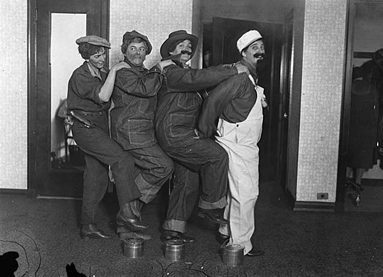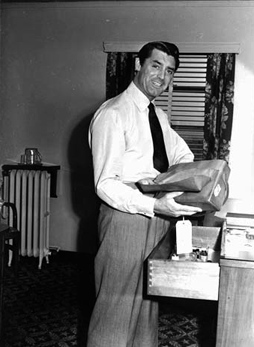Difference between revisions of "The Nicollet Hotel"
| (11 intermediate revisions by 3 users not shown) | |||
| Line 3: | Line 3: | ||
</div> | </div> | ||
| + | {{unprotected}} | ||
| + | The old Nicollet House was Minnesota’s finest hotel and a meeting place of the city’s elite long before workers completed the [[Old Minneapolis Courthouse/City Hall]] in 1908. In the 19th century, Minneapolis was a tiny island of sophistication in the old West, and that sophistication rested on the Nicollet. Reports suggest that the hotel, when built, shifted development away from the then-separate village of St. Anthony across the [[Mississippi River]].<small>(1)</small> | ||
| − | + | {| {{prettytable}} | |
| + | ! | ||
| + | ! | ||
| + | |- | ||
| + | | <div style="text-align: center;"> | ||
| + | [[Image:Nickydrag.png]] | ||
| + | </div><div style="text-align: center;"> | ||
| + | '''<small> Drag King act at the Nicollet Hotel, circa 1925. Courtesy of the Minnesota Historical Society.</small>''' | ||
| + | </div> | ||
| + | | It was the only Twin Cities hotel suitable to put up Oscar Wilde for the night in March of 1882, even if the aesthete complained about the unimpressive rooms and furniture.<small>(2)</small> Local businessmen took 40 years to agree with Wilde, and demolished the outdated structure in 1923. | ||
| − | + | In its place they built an 11-story mound of serious Art Deco hostelry, the “New Nicollet,” which employed over 100 maids, bellboys, elevator operators, waiters, musicians and other staff. These occupations (and with others in the service industry) provided young queer people with stable employment and the opportunity to live on their own outside of marriage. | |
| + | |} | ||
| + | {| {{prettytable}} | ||
| + | ! | ||
| + | ! | ||
| + | |- | ||
| + | | Financed by a public consortium of 1,600 investors, the enormous Nicollet experienced some financial difficulties. Namely, it went into private hands only 12 years after opening in the [[Gateway District]].<small>(3)</small> The building’s extravagance lasted longer than individual owners—Cary Grant and others in the Hollywood Victory Caravan found it suitable enough to stop in Minneapolis on their way to Washington, D.C. in 1942.<small>(4)</small> | ||
| − | |||
| − | |||
| + | It remained viable even as the rest of the Gateway fell into serious disrepute. The Nicollet fell on worse and worse times after the Federal Government subsidized the modern Sheraton-Ritz in 1963.<small>(5)</small> The building became outdated just as its predecessor had and, after a brief stint as an evangelical church and years of complete abandonment, it fell to the wreckers in 1991. As of 2010, the site remains a surface-level parking lot. | ||
| + | | <div style="text-align: center;"> | ||
| + | [[Image:Carey.png]] | ||
| + | </div> <div style="text-align: center;"> | ||
| + | '''<small>Carey Grant at the Nicollet in 1942. Courtesy of the Minnesota Historical Society.</small>''' | ||
| + | </div> | ||
| + | |} | ||
| − | |||
---- | ---- | ||
| − | This | + | ==This entry is part of:== |
| + | == [[Minneapolis/St. Paul, MN: 100 Queer Places in Minnesota History, (1860-2010)]]== | ||
| + | ---- | ||
| + | |||
| + | |||
| + | <small>(1)</small>“Why Minneapolis Crossed the River.” ''The Minneapolis Journal'', November 24th, 1938. Clipping from the Minneapolis Collection in Hennepin County Central Library. | ||
| + | |||
| + | <small>(2)</small> “Oscar Wilde in Minneapolis” The Minneapolis Journal, May 3, 1936. From the Minneapolis Collection at Hennepin County Central Library. Also: Ast, Emilie. “Oscar Wilde Shared the Stage with Bishop Ireland.” The Catholic Spirit, June 22, 2000. Page 48A | ||
| + | |||
| + | <small>(3)</small>Hitz, Ralph. “An Open Letter to Our Friends in Minneapolis Concerning the Hotel Nicollet” Advertisement from the National Hotel Management Co, Inc., February 3, 1936. | ||
| + | |||
| + | <small>(4)</small>"MHS Collections: When Stars 'Fell' on Minnesota" ''Minnesota History,'' Fall 1974. Availible at the following link: http://collections.mnhs.org/MNHistoryMagazine/articles/44/v44i03p108-112.pdf | ||
| + | |||
| + | <small>(5)</small>"86th Hotel of Sheraton Opens in Minneapolis" ''The Chicago Tribune'', 6/4/1963 | ||
| − | + | <small>(6)</small>"Wrecking Ball Takes Aim at Old Hotel: Nicollet Hotel to Come Down Unless Mayor of Minneapolis Moves to Postpone Demolition." ''The St. Paul Pioneer Press,'' 12/31/1990 | |
Latest revision as of 05:39, 2 February 2012
Between Washington, Nicollet, Hennepin, and Third Street, Minneapolis
The old Nicollet House was Minnesota’s finest hotel and a meeting place of the city’s elite long before workers completed the Old Minneapolis Courthouse/City Hall in 1908. In the 19th century, Minneapolis was a tiny island of sophistication in the old West, and that sophistication rested on the Nicollet. Reports suggest that the hotel, when built, shifted development away from the then-separate village of St. Anthony across the Mississippi River.(1)
Drag King act at the Nicollet Hotel, circa 1925. Courtesy of the Minnesota Historical Society. |
It was the only Twin Cities hotel suitable to put up Oscar Wilde for the night in March of 1882, even if the aesthete complained about the unimpressive rooms and furniture.(2) Local businessmen took 40 years to agree with Wilde, and demolished the outdated structure in 1923.
|
| Financed by a public consortium of 1,600 investors, the enormous Nicollet experienced some financial difficulties. Namely, it went into private hands only 12 years after opening in the Gateway District.(3) The building’s extravagance lasted longer than individual owners—Cary Grant and others in the Hollywood Victory Caravan found it suitable enough to stop in Minneapolis on their way to Washington, D.C. in 1942.(4)
|
Carey Grant at the Nicollet in 1942. Courtesy of the Minnesota Historical Society. |
This entry is part of:
Minneapolis/St. Paul, MN: 100 Queer Places in Minnesota History, (1860-2010)
(1)“Why Minneapolis Crossed the River.” The Minneapolis Journal, November 24th, 1938. Clipping from the Minneapolis Collection in Hennepin County Central Library.
(2) “Oscar Wilde in Minneapolis” The Minneapolis Journal, May 3, 1936. From the Minneapolis Collection at Hennepin County Central Library. Also: Ast, Emilie. “Oscar Wilde Shared the Stage with Bishop Ireland.” The Catholic Spirit, June 22, 2000. Page 48A
(3)Hitz, Ralph. “An Open Letter to Our Friends in Minneapolis Concerning the Hotel Nicollet” Advertisement from the National Hotel Management Co, Inc., February 3, 1936.
(4)"MHS Collections: When Stars 'Fell' on Minnesota" Minnesota History, Fall 1974. Availible at the following link: http://collections.mnhs.org/MNHistoryMagazine/articles/44/v44i03p108-112.pdf
(5)"86th Hotel of Sheraton Opens in Minneapolis" The Chicago Tribune, 6/4/1963
(6)"Wrecking Ball Takes Aim at Old Hotel: Nicollet Hotel to Come Down Unless Mayor of Minneapolis Moves to Postpone Demolition." The St. Paul Pioneer Press, 12/31/1990

